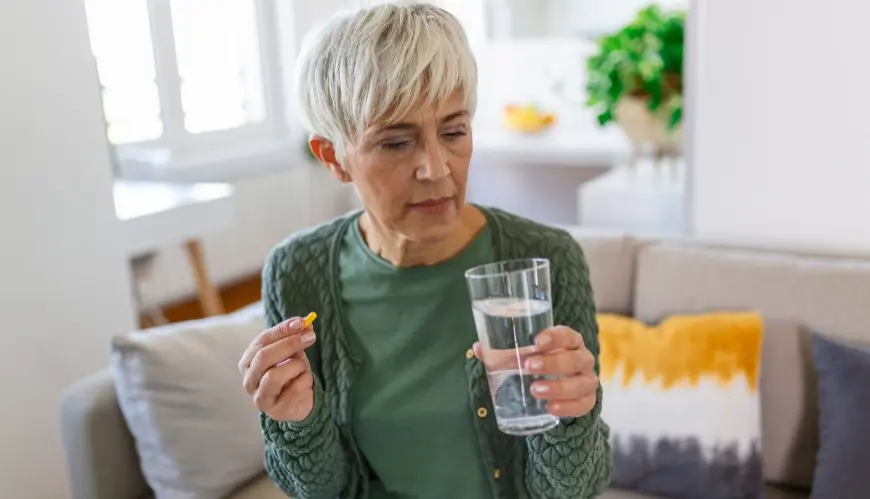If you're experiencing depression, usually the initial routes for help include undertaking therapy and making alterations to your lifestyle. It's not uncommon for a healthcare professional to prescribe an antidepressant medication (such as an SSRI) too.
But have you considered "natural" methods or non-prescription approaches for dealing with depression? How effective are they - are supplements useful in combating depression?
In this article, we'll explore some herbal substitutes and readily available, over-the-counter (OTC) products aimed at tackling depression. We will discuss their proven effectiveness and potential side effects that one should be aware of prior to consumption.
Quick Guideline
Discuss with your healthcare practitioner prior to testing any accessible depression or anxiety treatments sold without a prescription. While supplements for depressive disorders may appear largely harmless, they could possibly yield undesirable physical or mental health side effects in certain individuals.
Can Depression be Safely Self-Managed?
If you find that depression is clouding your life, it's highly recommended to reach out to a dependable physician or mental health expert. They can conduct various investigations to rule out any related underlying medical concerns. Once they have determined this, you and your health professional can collaborate on identifying an effective treatment plan.
Here are some symptoms of depression identified by the National Institute of Mental Health (NIMH). These indications should be consistently present for at least two weeks:
- Continual moods of sadness, anxiety or emptiness
- Overwhelming hopelessness
- Irritability
- Guilt-stricken emotions
- Losing interest in cherished hobbies or activities
- Persistent exhaustion
- Concentration difficulties
- Sleep disorders (including oversleeping)
- Appetite shifts
- Physical discomfort and pains
- Suicidal thoughts and preoccupation with death (in extreme instances)
The NIMH outlines numerous risk factors contributing towards developing depression - having relatives who struggle with mental illnesses, experiencing trauma or significant life changes, dealing with strainful circumstances or physical afflictions.
Conventional Therapy for Depression
Depression typically gets treated through a combination of counseling, otherwise known as talk therapy, and possibly a group of medications called antidepressants. But what impact do these medications have?
According to the National Health Service (NHS), antidepressants effectively raise concentrations of brain neurotransmitters that influence mood – such as serotonin and norepinephrine.
The following are frequently used types of antidepressants listed by The US Food and Drug Administration (FDA):
- SSRIs: Commonly referred to as "selective serotonin reuptake inhibitors." Familiar representatives from this category include brands like Zoloft, Prozac, and Lexapro.
- SNRIs: An abbreviation for "serotonin and norepinephrine reuptake inhibitors." It includes well-knowns like Cymbalta or Effexor XR.
- Tricyclic antidepressants: This older class is less likely prescribed compared to SSRIs or SNRIs. Recognized brand names cover Tofranil plus Asendin.
- MAOIs: Often referred to in its short form for "monoamine oxidase inhibitors", which also isn't commonly recommended. Usual commercial names involve Marplan along with Nardil.
Furthermore, there exist various other categories of antidepressant medication known under the umbrella term 'atypical' that could be deemed appropriate. A healthcare professional familiar with your case history can sit down with you to discuss potential advantages or disadvantages associated with each allowing you make an informed decision regarding treatment strategy.
Are Vitamins and Supplements Beneficial for Depression?
Occasionally, if conventional approaches have not been effective, individuals might consider natural solutions to depression. If you've decided with your general physician to explore a non-medical treatment of depression, there are several types available.
Bear in mind however that the perceived effectiveness of numerous nature-based treatments could stem from the placebo effect; believing they are working causes symptoms to improve according to Harvard Health Publishing.
Interestingly, an investigation published in February 2019 by the Journal of Affective Disorders argues that using commonplace over-the-counter supplements against depression - such as S-adenosyl methionine, folinic acid along with omega-3 fatty acids, 5-HTP and zinc picolinate - demonstrated less efficacy than a placebo combined with common therapy for managing depressive states.
In conclusion, while traditional substitutes or nutritious additions could potentially alleviate some symptoms for you personally; it's crucially important to consult your healthcare provider before implementing something new into your regimen.
Caution
Should your symptoms of depression persist or intensify despite utilizing natural therapies, don't hesitate to consult with your physician. They are in a position to assist you in devising alternative strategies for treatment.
Selecting Over-The-Counter Depression Remedies
It can be overwhelming to select an OTC supplement for depression given the multitude of options available. By narrowing your selection, you not only save energy and dollars but also time. If uncertainty looms around what product to opt for, consider asking yourself or your doctor these inquiries recommended by Mayo Clinic:
-
What symptoms am I experiencing? The type of remedy that best suits you correlates with the effects of depression encountered. For instance, if sleeplessness due to anxiety or depression is a hurdle, considering an over-the-counter supplement containing calming properties may soothe. However, opt against such supplements if energy shortage is identified as they tend to induce sedation.
-
What side-effects does this supplement yield? Some nonprescription medicines or even prescription ones could provoke undesirable consequences like weight fluctuation, diminished sexual interest, parched mouth or tension. Attempt finding one suitable for your physique (or initiates manageable adverse responses).
-
Interactions with other substances are mutual? Don't overlook scrutinizing whether there's a potential interaction between the chosen OTC medication and any prescribed drug/substance/vitamin currently consumed; certain foods might trigger reactions too.
-
Can it be detrimental on pre-existing health conditions? If increased blood pressure or similar exacerbations are induced due to consumption of certain supplements - existing health problems such as hypertension could aggravate.
-
Am I allowed ingestion during pregnancy/breastfeeding phase ?(if applicable). Do discuss with your physician before beginning natural treatments for depression are started whilst pregnant or lactating as medications/supplements might bear undue risks on infant wellness.
-
Any family history regarding usage documented? Sometimes it's less hassle opting a supplemental therapy previously favoured by immediate family members; their feedback about adverse effects might help avoid wrong choices.
Outlined below are some highly sought after OTC 'anti-depressants' showcasing varying levels of background research.
Tip
Always bear in mind that the FDA does not approve supplements, vitamins, and herbal remedies before they hit the market. Although some manufacturers might employ independent testing and may obtain verification from certain institutions, they don't fall under as stringent regulations as prescription drugs do. This implies that the quantities and ingredients stated on labels could sometimes be inaccurate or misleading, according to information found at FDA.
1. St. John's Wort
Some Evidence
St. John's wort, or Hypericum perforatum, can commonly be seen in Europe and parts of US growing wildly in nature. The yellow flower of the plant is widely recognized for its medicinal properties, allegedly causing a surge in one's brain serotonin levels that influence your mood states according to National Center for Complementary and Integrative Health (NCCIH). All over Europe it is prescribed by doctors with ease whereas at health food stores and pharmacies in the United States you'll find it mainly as an over-the-counter pill.
A review from September 2016 published by Systematic Reviews showed that daily usage of St. John's wort was indeed superior to placebos when dealing with symptoms related to mild or moderate depression without trailing too far behind prescription antidepressants efficacy-wise.
Yet another research study from September 2022 featured on Cureus revealed how effectively the herb could potentially mirror the results obtained through standard depressive treatments while also suggesting further studies backing utility against anxiety or post-menopausal issues being worthwhile but requesting more impactful evidence which substanitally proves these benefits.
Use caution because testing out St. John's wort may not yield effects continuously similar to those achieved through medication prescriptions along with harmful interactive consequences if used in conjunction with other medications like:
- Antidepressants
- Antihistamines
- Plavix (antiplatelet drug)
- Coughing syrup
- Immunosuppressant drugs
- Birth control pills
- Heart-related medicines
- HIV treatment drugs
- Xanax (symptomatic anxiety treatment)
- Sedative drugs
- Migraine-related medicine
- Anticoagulants (blood thinners)
- Statins
Side effects commonly associated with St. John's wort usage are upset stomach, dry mouth, headaches, tiredness or fatigue, bouts of dizziness and sexual dysfunction; along with enhanced sun sensitivity according to NCCIH.
In extreme cases overuse of St. John's wort can lead to a deadly surge in serotonin levels dubbed as the 'serotonin syndrome'. If symptoms such as boosted body temperature, abnormal heartbeats or palpitations, diarrhea episodes and increased blood pressure manifest at any given point alongside agitation it is critical that you immediately dial your healthcare professional or rush to your nearest emergency service center.
Caution Alert
St. John's wort usage in combination with antidepressants or any drugs that rise your serotonin levels, is strongly discouraged. Notably, this herb can intensify psychotic signs in individuals suffering from schizophrenia and bipolar disorder. Thus, it is always advisable to consult your healthcare provider before starting this natural remedy as recommended by the NCCIH.
2. Omega-3 Fatty Acids
Limited Evidence
Omega-3 fatty acids are beneficial fats that facilitate various functions in your body, not least of them being brain wellness. Diets rich in omega-3s, like those which include oily fish, have been linked to elevated memory capacity, cognitive performance and cerebral blood circulation as per a study published in Cureus in October 2022. Such effects appear particularly advantageous for seniors susceptible to cognitive deterioration.
Research suggests omega-3s could award relief from symptoms of depression as well - more specifically the EPA variant rather than its DHA counterpart. According to a meta-analysis revealed by Translational Psychiatry in August 2019; supplements comprising over 60% EPA with daily dosages around one gram seem proficient at alleviating depressive states.
Regardless though, it is intrinsically positive for holistic wellbeing to regularly ingest sufficient amounts of omega-3s via food or supplementary intakes – these bear minor side-effects compared generally with alternative organic remedies: consumption of fish oil capsules may induce elementary gastric discomfort or halitosis (bad breath) as noted by NCCIH.
An added advantage exists too: most medications including antidepressants can be simultaneously administered alongside fish oil intended for treating depression but those on anticoagulants should exercise caution since fish oil might amplify their action according to NCCIH.
3. 5-HTP
Inadequate Evidence
The compound referred to as 5-hydroxytryptophan, or succinctly as 5-HTP, is another natural element that may raise serotonin amounts in the brain and subsequently enhance your emotional state.
The body naturally produces 5-HTP during the conversion of the amino acid L-tryptophan. However, it's also available for purchase over-the-counter in tablet form, derived from the seeds of an African bush (Griffonia simplicifolia), according to the Memorial Sloan Kettering Cancer Center (MSKCC).
There are tentative indications that 5-HTP might be beneficial for certain forms of depression, says MSKCC. Nevertheless, there's a need for more rigorous studies to authenticate its safety and efficacy levels.
For instance, a November 2016 publication in Trends in Pharmacological Sciences suggested this supplement could potentially serve as therapeutic recourse against resistant depression if prepared as a slow-release pill.
If you're contemplating trying out 5-HTP after approval from your doctor, these tablets are widely available online or at health food outlets.
Its use does come with potential side effects such as stomach discomforts like heartburn and nausea; throwing up; diarrhea; sexual dysfunctionality; along with muscular issues per data provided by The National Library of Medicine. High doses ranging between six to ten grams daily pose danger given their linkages with severe gastric disorders and muscle spasms. Additionally one faces risks relating Serotonin Syndrome according to Mount Sinai Health Systems.
Presently, it's not advisable to consume 5-HTP if you're pregnant or breastfeeding, suffer from hypertension or diabetes, have liver disease issues or are on antidepressants. Furthermore, people should desist consuming this stuff a fortnight before undergoing any surgical procedures as per Kaiser Permanente advice to circumvent the serotonin syndrome.
4. S-Adenosyl-L-Methionine (SAMe)
Inadequate Evidence
S-Adenosyl-L-Methionine, more commonly known as SAMe, is one compound promoted as a natural solution for depression. According to the Mayo Clinic, this compound naturally occurs within our bodies and an artificial variation is available in supplement form. Capsule versions are readily found online or in most health food shops.
A review published by the Journal of Clinical Psychiatryin December 2017 suggests that there's insubstantial yet hopeful evidence showing SAMe's efficiency and safety in treating depression symptoms.
Additionally, a September 2020 study featured in the Annals of General Psychiatry revealed mixed findings - while some studies affirmed that SAMe was notably more efficient than placebos, others deemed it no better than traditional antidepressants.
When consumed excessively, Mount Sinai reports that SAMe can provoke several side effects:
- Nausea
- Headache
- Anxiety
- Sweating
- Dizzy feelings
- Palpitations of the heart
- In rare instances, may create manic episodes
Consequently, starting with low doses (around 200 milligrams) is recommended. Dosage adjustment should only be carried out upon doctor consultation according to Mount Sinai. Important note: For pregnant individuals, those chestfeeding or dealing with bipolar disorder as well people on prescription for antidepressants or narcotics such anti-cough syrups are advised against taking SAMe due to potential interactions warned by Mount Sinai.
5. Rhodiola Rosea
Minimal Research Supports Usage
Often known as the Arctic root, Rhodiola rosea is a botanical species found in regions such as Alaska, Northern Europe, Sweden and Iceland. In traditional European medical practice, this plant was utilized to enhance stamina and alleviate tiredness among other symptoms according to the NCCIH. In recent times, it is advocated for assisting with various circumstances including depression.
Scientific research on Rhodiola rosea largely consists of animal studies while studies evaluating its effects in humans are quite scarce according to NCCIH.
One noteworthy observation from human clinical trials was that Rhodiola rosea might exhibit minimal side effects compared to routine depression drugs. A trial conducted in March 2015 published on Phytomedicine disclosed that though Rhodiola rosea presented lesser efficacy than sertraline (widely used SSRI for depression) pertaining treatment of depression; it had fewer side effects reported like dryness of mouth, excess salivation and dizziness according to NCCIH.
Individuals suffering from high blood pressure or consuming blood pressure medications should refrain from using this herb considering its inherent property to lower blood pressure levels. Similarly people prescribed with antidepressants are warned against intake of Rhodiola rosaecautioned by Merck Manual.
6. L-Tryptophan
Lack Of Evidence
While its derivative, 5-HTP, shows some efficacy and safety in treating depression, there's not enough concrete proof to assert that L-tryptophan supplements can help alleviate depressive symptoms.
L-tryptophan which is present naturally in food items such as turkey, milk, and cheese has been shown to enhance mood while reducing irritability and anxiety amongst those struggling with depression according to a study published in December 2014 within the Archives of Psychiatric Nursing.
Should you opt for L-tryptophan supplementation you may experience various side effects which include diarrhea, gaseous disturbance, abdominal pain & sleepiness. When mixed with sedative medications it could lead to slowed breathing or potentially Serotonin Syndrome (when combined with other serotonin-enhancing drugs) that requires immediate medical intervention states the National Library of Medicine (NLM).
People who are pregnant or nursing nor those on sedatives or certain serotonin boosting drugs should refrain from taking these supplements. Furthermore, NLM also highlights inadequate information when it comes to long-term usage of L-tryptophan supplementation.
When to Consult a Medical Professional
When you're experiencing feelings of depression that are hampering your daily life - preventing you from going to work, attending school, or participating in other activities - it's essential to speak with a doctor or seek advice from a reputable mental health professional. These experts can help determine whether an underlying health issue is causing your depression and recommend the most suitable treatment for you. Generally, the initial approach may include talk therapy, lifestyle modifications and prescriptive antidepressants.
Although there exist herbal supplements for depression on offer, current research does not extensively back their consistent efficacy. They may be effective due only to perceived benefits (placebo effect), besides potentially having side effects.
Should you prefer exploring non-prescription alternatives as supplements for depression, consult with your physician prior to beginning such treatments. They can assist in determining if these natural options are safe and beneficial for your personal needs.




